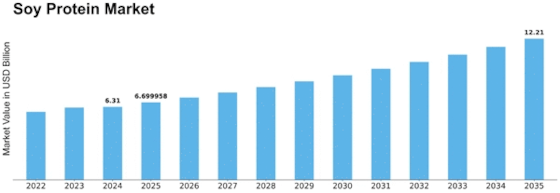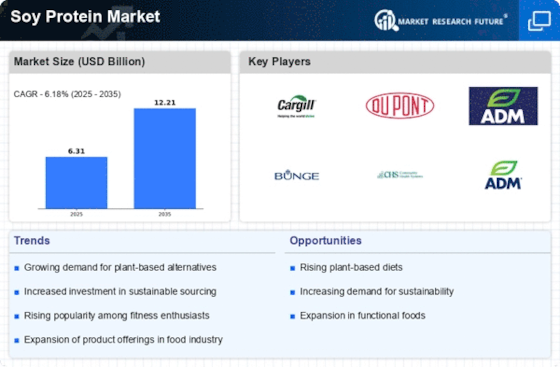Soy Protein Size
Soy Protein Market Growth Projections and Opportunities
The soy protein market has experienced notable trends in recent years, reflecting shifts in dietary preferences, health consciousness, and industry innovations. One significant trend is the growing popularity of plant-based protein sources. As more consumers embrace vegetarian, vegan, and flexitarian lifestyles, there is a rising demand for plant-based protein alternatives to meat and dairy products. Soy protein, derived from soybeans, has emerged as a key player in this market due to its high protein content, versatility, and nutritional benefits. Soy protein is used in a wide range of food products, including plant-based meat substitutes, dairy alternatives, protein bars, shakes, and snacks, catering to consumers seeking sustainable, plant-based protein options.
Another noteworthy trend in the soy protein market is the increasing demand for functional and fortified food products. Consumers are looking for foods that not only provide essential nutrients but also offer additional health benefits, such as improved digestion, heart health, and muscle recovery. Soy protein is being used as a functional ingredient in fortified foods and beverages, such as breakfast cereals, energy bars, and protein drinks, to enhance their nutritional profile and appeal to health-conscious consumers. Additionally, soy protein isolates and concentrates are valued for their functional properties, including emulsification, binding, and foaming, making them popular ingredients in a variety of food applications.
The rise of sports nutrition and active lifestyles is driving growth in the soy protein market. Athletes, fitness enthusiasts, and active individuals are incorporating soy protein supplements into their diets to support muscle growth, recovery, and overall performance. Soy protein powders, shakes, and bars are widely used by athletes and gym-goers as convenient and effective sources of high-quality protein. Soy protein's complete amino acid profile and bioavailability make it an ideal choice for muscle building and recovery, fueling its popularity among the sports nutrition market.
Furthermore, the increasing prevalence of food allergies and intolerances is fueling demand for allergen-friendly protein options. Soy protein is naturally free from common allergens such as gluten, dairy, and nuts, making it suitable for consumers with food sensitivities or dietary restrictions. As awareness of food allergies and intolerances grows, there is a growing demand for soy protein-based products labeled as allergen-free or hypoallergenic, catering to consumers seeking safe and convenient protein sources.
Sustainability and environmental concerns are also influencing market trends in the soy protein industry. Soybeans are considered a sustainable crop due to their high yield per acre, efficient use of resources, and ability to enrich soil fertility. Additionally, soy protein production has a lower carbon footprint compared to animal-derived proteins such as beef and dairy. As consumers become more environmentally conscious, there is a growing preference for plant-based proteins like soy that are produced in an environmentally friendly manner. Manufacturers are responding by sourcing sustainably grown soybeans and implementing eco-friendly production practices to appeal to eco-conscious consumers and reduce their environmental impact.
Technological advancements and innovation are driving growth and diversification in the soy protein market. Manufacturers are investing in research and development to improve soy protein extraction methods, enhance product quality, and develop new formulations with improved flavor, texture, and functionality. Advanced processing technologies such as enzymatic hydrolysis, membrane filtration, and microencapsulation enable the production of soy protein ingredients with enhanced solubility, dispersibility, and sensory attributes. Additionally, innovations in soy protein-based meat analogs and plant-based dairy alternatives are expanding the market reach of soy protein, offering consumers new and innovative ways to incorporate plant-based proteins into their diets.




















Leave a Comment